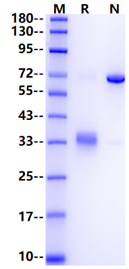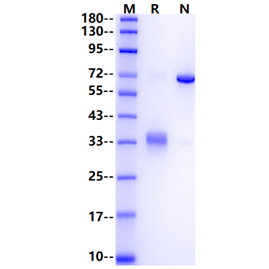Product Details
Product Details
Product Specification
| Species | Human |
| Antigen | TWEAKR/TNFRSF12A |
| Synonyms | TNFRSF12A,FGF-inducible 14,FN14,TweakR,CD266 |
| Accession | Q9NP84 |
| Amino Acid Sequence |
Glu28-Trp79, with N-terminal Human IgG Fc PKSSDKTHTCPPCPAPELLGGPSVFLFPPKPKDTLMISRTPEVTCVVVDVSHEDPEVKFNWYVDGVEVHNAKTKPREEQYNSTYRVVSVLTVLHQDWLNGKEYKCKVSNKALPAPIEKTISKAKGQPREPQVYTLPPSRDELTKNQVSLTCLVKGFYPSDIAVEWESNGQPENNYKTTPPVLDSDGSFFLYSKLTVDKSRWQQGNVFSCSVMHEALHNHYTQKSLSLSPGKIEGREQAPGTAPCSRGSSWSADLDKCMDCASCRARPHSDFCLGCAAAPPAPFRLLW |
| Expression System | HEK293 |
| Molecular Weight | 33-35kDa (Reducing) |
| Purity | >95% by SDS-PAGE |
| Endotoxin | <0.1EU/μg |
| Conjugation | Unconjugated |
| Tag | Human Fc Tag |
| Physical Appearance | Lyophilized Powder |
| Storage Buffer | PBS, pH7.4 |
| Reconstitution | Reconstitute at 0.1-1 mg/ml according to the size in ultrapure water after rapid centrifugation. |
| Stability & Storage | · 12 months from date of receipt, lyophilized powder stored at -20 to -80℃. · 3 months, -20 to -80℃ under sterile conditions after reconstitution. · 1 week, 2 to 8℃ under sterile conditions after reconstitution. · Please avoid repeated freeze-thaw cycles. |
| Reference | 1.Feng, S. et al. (2000) Am J. Pathol.156:1253. |
Background
TNFRSF12A was initially identified as a fibroblast growth factor-1-inducible gene in murine NIH 3T3 cells, and was named as fibroblast growth factor-inducible-14 (Fn14) gene. Human TNFRSF12A was cloned from a HUVEC cDNA library and identified as the TWEAK receptor and a member of the TNFR family. TNFRSF12A is highly expressed in heart, placenta and kidney. TNFRSF12A / FN14 promotes angiogenesis and the proliferation of endothelial cells. TNFRSF12A and its ligand play a key role in muscle atrophy, cerebral ischemia, kidney injury, atherosclerosis, experimental autoimmune encephalitis, rheumatoid arthritis, and inflammatory bowel disease.
Picture
Picture
SDS-PAGE



